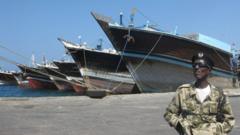Amid offers from Somalia's President Hassan Sheikh Mohamud to bolster US security operations, Somaliland's Foreign Affairs Minister, Abdirahman Dahir Aden, criticized the move as "desperate," insisting that external support for Somaliland's recognition is growing stronger. As developments unfold, tensions between the federal government and various semi-autonomous regions like Puntland may further complicate the geopolitical landscape. Moreover, Somaliland's relationship with foreign allies, notably the UAE, remains pivotal in its sovereignty and regional influence.
The strategic port city of Berbera, located on the Gulf of Aden, is crucial for trade and military logistics, especially given the presence of militant groups in the region. The US has historically played a significant role in Somalia's security, applying pressure on groups like al-Shabab, but fluctuations in political support may shift long-standing partnerships. As Somaliland continues to assert its agency, the broader implications for US involvement in the region remain to be seen.
In contrast, Somalia's internal divisions may pose challenges to Mogadishu's efforts to engage with international players like the US. Last year's disputes involving foreign entities over Somaliland's ports highlight ongoing tensions, leaving the region's geopolitical dynamics precarious.
The strategic port city of Berbera, located on the Gulf of Aden, is crucial for trade and military logistics, especially given the presence of militant groups in the region. The US has historically played a significant role in Somalia's security, applying pressure on groups like al-Shabab, but fluctuations in political support may shift long-standing partnerships. As Somaliland continues to assert its agency, the broader implications for US involvement in the region remain to be seen.
In contrast, Somalia's internal divisions may pose challenges to Mogadishu's efforts to engage with international players like the US. Last year's disputes involving foreign entities over Somaliland's ports highlight ongoing tensions, leaving the region's geopolitical dynamics precarious.




















